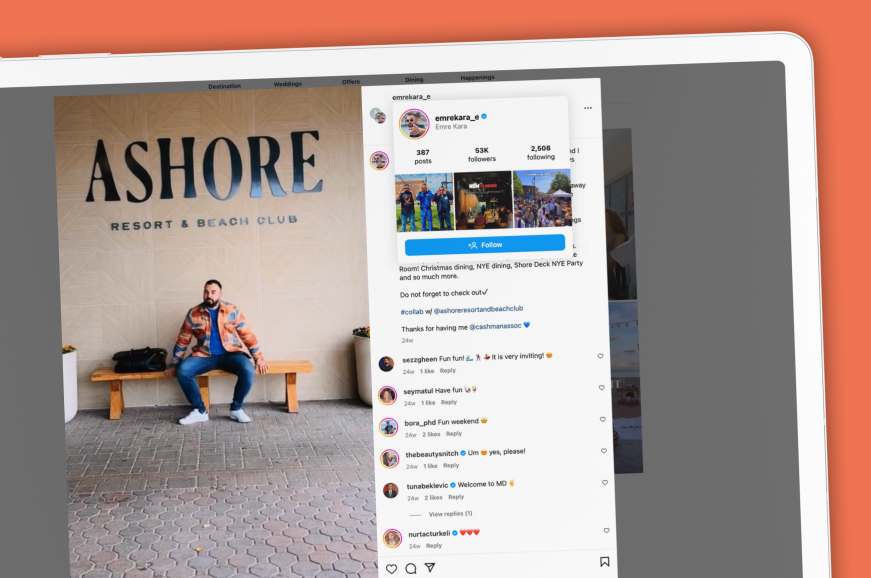Is Your Hotel Active, Engaged, and Investing in Social Media? If Not, You Might be Missing a Big Opportunity.

There’s no denying the impressive reach and powerful influence of social media has had on the hospitality industry. But knowing how best to tap into that potential has always been a challenge.
According to a recent American Express survey, 39 percent of respondents said they turn to social media for travel inspiration. And roughly one-third of U.S. travelers relied on Instagram, Facebook, TikTok, and YouTube to research their vacations, according to another study.
One thing is certain: With more and more people relying on social media to research and plan trips, determining how to leverage organic and paid social media for your property is imperative.
Let’s take a look at how you can make the most out of your social media investment.
Why Invest in Social Media?
If you’re a Courtyard by Marriott or a Fairfield Inn or another familiar link in a branded hotel chain, maintaining an active social media presence may not be as important. Your brand already provides that umbrella of recognition.
But if you’re an independent owner or brand, social media is a critical way to connect with your audience and build brand awareness.
You need to evaluate who you are, what image you want to project, and how you’re going to reach your audience through social media.
For example, if you have a 10-room bed and breakfast, determine how to reach the audiences that are active on social media looking at properties like yours. And they’re doing research on social media to see if you’re as cool as you say you are. Can you provide them that validation? You can if you are active, visible, and engaged.
Or, if they’re not actively booking a trip, is your social media feed consistent and compelling enough to plant a seed for them down the line when they’re ready to book?
No matter how you slice it, social media is a worthwhile investment. It just comes down to understanding what level of investment is right for you — and which platforms to focus on.
Staking Your Space in the Social Media Sphere
Whether you’re already deeply engaged in social media or just getting up to speed, there’s a reliable sequence to follow to make it worthwhile. Here are some simple steps you can take now to get started down the right path.
Selecting the right social media platforms
There are numerous social media platforms you might consider options for the hospitality industry. But YouTube, Instagram and Facebook are the most popular in the hospitality industry. Worldwide, 40 percent of travelers researched YouTube for their trips, 33 percent used Instagram, and 26 percent used Facebook, according to one study.
If you’re a trendy, boutique property going after younger travelers, then maybe a TikTok (21 percent of travelers in the same study) presence may be right for you.
The key takeaway is that social media is a source for travel research and inspiration, and you need to make sure you’re being aggressive in reaching those potential customers.
Set the right goals
Social media success starts with establishing clear, appropriate goals based on your objectives — and the unique value organic and paid social media can respectively deliver.
For example, if your goal is to drive $50,000 in new revenue, organic social media alone probably won’t get you there. That will require a targeted paid social media campaign. But if you want more brand recognition and are looking to garner 500,000 impressions, then a regular cadence of organic posts might be just what you need.
Your goals influence everything, including: the channels you should be in, the frequency of posts, the type of content you develop, and how much you should be spending. So figuring out what you’re looking to accomplish is the first step in determining the right social media strategy for you.
Know your target audience
The potency of social media lies in its potential to create authentic connections between you and your customers. But to do that, you need to understand who those customers are, what they are looking for, and how you can cultivate a relationship with them.
First, meet them where they are. You know the type of customer who stays with you. To find out where they spend their time on social media, you can ask them directly with an email survey or in-person survey. Short of that, a little online research based on your audience’s demographics can yield a lot of insight into their social media habits and preferences.
For paid social, every platform has extensive targeting features that allow you to focus on a specific audience based on everything from income and age to gender and geography. With paid, you have more dials to turn: audience targeting parameters, campaign objectives, creative formats, and budgets.
Create compelling content
With your goals set, target audience chosen, platforms and campaigns sorted (organic vs. paid or both), it’s time to fill those feeds with content.
The type of content you deliver will be informed by the choices you’ve made up to this point. Whether you use imagery, videos, user-generated content, or a combination of all of the above comes down to which platforms you’re using. But creating content consistently for any campaign is key. The frequency of posts will depend on the type of campaign but ultimately comes down to your budget and staffing.
Here are some content ideas you can consider regardless of post type, platform, or posting frequency:
- Influencer partnership. Work with local influencers, bloggers, or social media personalities to promote your hotel. Offer them a stay in exchange for creating content showcasing your property, amenities, and local experiences. Their followers will get an authentic glimpse into what makes your property unique.
- User-generated content contest. Encourage guests to share their experiences at your hotel. Ask them to post photos or videos with a specific hashtag for a chance to win a free stay or other prizes. This campaign can increase engagement, showcase your hotel through the eyes of guests, and provide valuable content for your social media channels.
- Local highlights. Showcase the unique local experiences your hotel offers with a series of posts, stories, or videos highlighting nearby attractions, restaurants, events, or outdoor activities. Work with local businesses to cross-promote and offer special packages or discounts for your guests.
- Behind-the-scenes sneak peeks. Give glimpses into your hotel operations, staff, or renovations. This campaign humanizes your brand, builds trust, and gives potential guests an inside look at what sets your hotel apart.
- Seasonal or holiday promotions. Create special promotions or packages tailored to upcoming seasons or holidays. Share visually appealing images or videos showcasing your festive decor, themed amenities, or seasonal experiences. Offer exclusive discounts or giveaways to social media followers.
- Social media takeovers. Invite travel bloggers, journalists, or local personalities to run your social media channels for a day or a weekend. They can share their experiences at your hotel and in the surrounding area, providing fresh content and reaching new audiences.
Measure your progress
With a campaign underway, how do you measure performance against your goals? There are several ways to track your progress.
Organic campaigns can use a variety of measurements to determine their effectiveness:
- Engagement. The number of likes, comments, and shares on posts.
- Reach and impressions. Unique users who see your content and total impressions (number of times your content is displayed).
- Followers. Changes in the number of followers across your social media platforms.
- Website traffic. Monitor changes in website sessions, pageviews, and bounce rates.
With a paid social media campaign, you have additional ways to measure its performance:
- Cost per click (CPC). The cost of each click on your paid ads. A lower CPC indicates more efficient ad targeting and better value for your ad spend.
- Click-through rate (CTR). The percentage of people who click on your ad after seeing it. A higher CTR suggests that your ad creative and targeting are resonating with your audience.
- Cost per acquisition (CPA). The cost of acquiring a desired action, such as a booking or lead. Lower CPA indicates a more effective campaign in driving conversions.
- Return on ad spend (ROAS). Revenue generated from bookings or sales divided by the ad spend. Higher ROAS means you’re getting a better return on your advertising investment.
Whether you’re conducting an organic, paid social campaign, or both, understanding how your social media strategy is performing lets you know if you need to adjust your target audience, provide different content, or consider a different platform altogether.
Get More Than Clicks Out of Your Social Media Campaigns
The travelers you want to reach are actively browsing social media — and being influenced by what they see there. With smart organic social tactics and data-driven paid campaigns, your independent hotel can elevate its social presence, capture that valuable attention, and turn more of those scrolling thumbs into arriving guests.
If you’d like to learn how O’Rourke advises hotels on creating effective social media campaigns, we’d love to hear from you.

